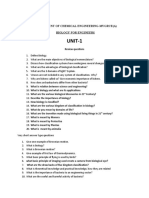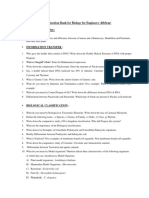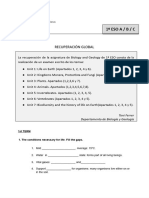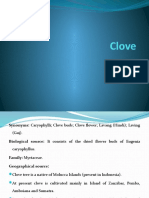0 ratings0% found this document useful (0 votes)
34 views12th Botany
12th Botany
Uploaded by
ejg0453The document provides biology questions from various units covering topics like botany, genetics, biotechnology, ecology and agriculture. The questions are multiple choice or short answer type and cover key concepts. Examples include questions about grafting, tissue culture, gene mapping, bioremediation, ecosystem dynamics, plant breeding techniques and economic plants.
Copyright:
© All Rights Reserved
Available Formats
Download as PDF, TXT or read online from Scribd
12th Botany
12th Botany
Uploaded by
ejg04530 ratings0% found this document useful (0 votes)
34 views2 pagesThe document provides biology questions from various units covering topics like botany, genetics, biotechnology, ecology and agriculture. The questions are multiple choice or short answer type and cover key concepts. Examples include questions about grafting, tissue culture, gene mapping, bioremediation, ecosystem dynamics, plant breeding techniques and economic plants.
Original Description:
Go important questions
Copyright
© © All Rights Reserved
Available Formats
PDF, TXT or read online from Scribd
Share this document
Did you find this document useful?
Is this content inappropriate?
The document provides biology questions from various units covering topics like botany, genetics, biotechnology, ecology and agriculture. The questions are multiple choice or short answer type and cover key concepts. Examples include questions about grafting, tissue culture, gene mapping, bioremediation, ecosystem dynamics, plant breeding techniques and economic plants.
Copyright:
© All Rights Reserved
Available Formats
Download as PDF, TXT or read online from Scribd
Download as pdf or txt
0 ratings0% found this document useful (0 votes)
34 views2 pages12th Botany
12th Botany
Uploaded by
ejg0453The document provides biology questions from various units covering topics like botany, genetics, biotechnology, ecology and agriculture. The questions are multiple choice or short answer type and cover key concepts. Examples include questions about grafting, tissue culture, gene mapping, bioremediation, ecosystem dynamics, plant breeding techniques and economic plants.
Copyright:
© All Rights Reserved
Available Formats
Download as PDF, TXT or read online from Scribd
Download as pdf or txt
You are on page 1of 2
www.nammakalvi.
com
MALAR TRUST INDIA – EACHAMPALLAM (CHENGALPATTU DIST.,)
BIOLOGY QUESTION BANK by Mr.S. AJITH KUMAR
BIOLOGY-BOTANY: 3. Write the salient features of Sutton and
Boveri concept.
UNIT-1: 4. What is gene mapping? Write its uses.
1. Differentiate Grafting and Layering 5. Write the steps involved in molecular
2. “Tissue culture is the best method for mechanism of DNA recombination with
propagating rare and endangered plant diagram.
species”- Discuss. 6. Mention the name of man-made cereal.
3. What is Cantharophily How it is formed?
7. How sex is determined in monoecious
4. What is endothelium.
5. Define the term Diplospory. plants. write their genes involved in it.
6. List out the functions of tapetum. 8. Draw the diagram of different types of
7. “Endothecium is associated with aneuploidy.
dehiscence of anther” Justify the UNIT-4:
statement.
8. What is Mellitophily? 1. Name the chemicals used in gene
9. Write short note on Heterostyly. transfer.
10. Discuss the steps involved in 2. What do you know about the word
Microsporogenesis pBR332?
11. With a suitable diagram explain the 3. Mention the application of
structure of an ovule. Biotechnology.
12. What is endosperm. Explain the types. 4. What are restriction enzyme. Mention
13. Differentiate the structure of Dicot and their type with role in Biotechnology
Monocot seed. 5. Compare the various types of Blotting
14. Give a detailed account on techniques.
parthenocarpy. Add a note on its 6. Write the advantages and disadvantages
significance. of Bt cotton.
7. What is bioremediation? give some
UNIT-2: examples of bioremediation.
1. What is back cross? 8. Write the benefits and risk of
Genetically Modified Foods.
2. What are multiple alleles
9. How will you identify a vectors?
3. Explain the law of dominance in
monohybrid cross. UNIT-5:
4. Differentiate incomplete dominance and
codominance. 1. What do you mean Embryoids? Write
5. What is meant by cytoplasmic its application.
inheritance Differentiate continuous 2. Explain the basic concepts involved in
variation with discontinuous variation plant tissue culture.
3. Give an account on Cryopreservation.
UNIT-3: 4. What do you know about Germplasm
1. What is the difference between missense conservation. Describe it.
5. Write the protocol for artificial seed
and nonsense mutation?
preparation.
2. Explain the mechanism of crossing over.
www.nammakalvi.com
MALAR TRUST INDIA – EACHAMPALLAM (CHENGALPATTU DIST.,)
BIOLOGY QUESTION BANK by Mr.S. AJITH KUMAR
UNIT-6: accordingly. Find out the type of
succession and explain in detail. Reed-
1. What is Phytoremediation ? swamp stage, phytoplankton stage,
2. Soil formation can be initiated by shrub stage, submerged plant stage,
biological organisms. Explain how? forest stage, submerge
3. Distinguish habitat and niche 5. What will happen if all producers are
4. What is mutualism? Mention any two removed from ecosystem?
example where the organisms involved UNIT-8:
are commercially exploited in modern 1. What is ozone hole?
agriculture. 2. Expand CCS.
5. What is vivipary? Name a plant group 3. Suggest a solution to water crisis and
which exhibits vivipary. explain its advantages.
6. What is thermal stratification? Mention 4. Explain afforestation with case studies.
their types 5. What are the effects of deforestation
7. What is seed ball? and benefits of agro foresty?
8. What is co evolution? UNIT-9:
9. How is anemochory differ from 1. Differentiate primary introduction from
zoochory? secondary introduction.
10. List out the effects of fire to plants. 2. What are the different types of
11. Explain different types of hydrophytes hybridization?
with examples. 3. Write a note on heterosis.
12. What are the advantages of seed 4. List out the new breeding techniques
dispersal? involved in developing new traits in
13. Enumerate the anatomical adaptations of plant breeding.
xerophytes.
14. List out any five morphological UNIT-10:
adaptations of halophytes.
15. Describe dispersal of fruit and seeds by 1. What is pseudo cereal? Give an
animals. example.
2. Give definitions for organic farming?
UNIT-7: 3. Which is called as the “King of
Bitters”? Mention their medicinal
1. Pyramid of energy is always upright. importance.
Give reasons 4. Differentiate bio-medicines and
2. Construct the food chain with the botanical medicines
following data. Hawk, plants, frog, 5. What is TSM? How does it classified
snake, grasshopper and what does it focuses on?
3. Draw a pyramid from following details 6. Write the economic importance of rice.
and explain in brief. Quantities of 7. Write the advantage and disadvantage of
organisms are given-Hawks-50, plants- Golden Rice.
1000.rabbit and mouse-250 +250, 8. What are the King and Queen of spices?
pythons and lizard- 100 + 50 Explain about them and their uses.
respectively. 9. Enumerate the uses of turmeric.
4. Various stages of succession are given 10. What are millets? What are its types?
bellow. From that rearrange them Give example for each type.
You might also like
- 12 Oyeku OturuponDocument28 pages12 Oyeku OturuponAbraham Jose Zambrano100% (1)
- Ars Magica To D20 Conversion RulesDocument82 pagesArs Magica To D20 Conversion RulesFrank BravataNo ratings yet
- BioDocument22 pagesBioDev RajuNo ratings yet
- Uganda Martyrs University Programmes and Fees StructureDocument14 pagesUganda Martyrs University Programmes and Fees StructureThe Campus Times100% (6)
- Biology B Midterm Study GuideDocument4 pagesBiology B Midterm Study GuideMinh Nguyen DucNo ratings yet
- 1st Year Biology Important Short &long QuestionsDocument4 pages1st Year Biology Important Short &long Questionsbdigitalacademy3367No ratings yet
- JR BOTANY IMPORTANT QUESTIONSDocument5 pagesJR BOTANY IMPORTANT QUESTIONSrajasekaraNo ratings yet
- TS JR Botany Imp QuestionsDocument4 pagesTS JR Botany Imp Questionsswayam.amandeep.pradhanNo ratings yet
- 9TH GUESS Biology - Final - Term 2019-1 PDFDocument5 pages9TH GUESS Biology - Final - Term 2019-1 PDFAurang ZaibNo ratings yet
- 12th Std 3 and 5 Marks__RMADocument2 pages12th Std 3 and 5 Marks__RMAzenathk2580No ratings yet
- 11th STD BIO-BOTANY Revised English Medium Book Back AnsDocument51 pages11th STD BIO-BOTANY Revised English Medium Book Back AnsDeepsha online100% (2)
- 11th STD Bio-Botany Revised EM 2023 Book Back AnswersDocument52 pages11th STD Bio-Botany Revised EM 2023 Book Back AnswerspranavcbeNo ratings yet
- BT I 2018 Revision Question Bank Class Xi: Living World and Biological ClassificationDocument8 pagesBT I 2018 Revision Question Bank Class Xi: Living World and Biological ClassificationNaman BobalNo ratings yet
- Class 11 Biology Botany em Revised Edition-2020 English Medium Book Back Answers C.kishore KumarDocument51 pagesClass 11 Biology Botany em Revised Edition-2020 English Medium Book Back Answers C.kishore KumarRagaviNo ratings yet
- Cmda Bot 102 TestDocument3 pagesCmda Bot 102 TestObinna AdolalomNo ratings yet
- Hots VBQ Class Xii Biology Q Value Points - Docx 119874201Document21 pagesHots VBQ Class Xii Biology Q Value Points - Docx 119874201reenaarumugamNo ratings yet
- CLASS XII BIOLOGY Important QsDocument5 pagesCLASS XII BIOLOGY Important QsShawan AhmadNo ratings yet
- Botany 1st Year Imporstant QuestionsDocument63 pagesBotany 1st Year Imporstant Questionsangadibalajithkumar100% (4)
- Final Biology 40S Exam Review January 2018Document23 pagesFinal Biology 40S Exam Review January 2018andreasNo ratings yet
- TEMA 2 Biology 1 EsoDocument6 pagesTEMA 2 Biology 1 EsoAnonymous KcmdnkfIdNo ratings yet
- Biology Worksheets - XIIDocument188 pagesBiology Worksheets - XIIlatishabasilNo ratings yet
- 12-BIOLOGY QUESTION BANK (With Value Based Questions) - 1Document33 pages12-BIOLOGY QUESTION BANK (With Value Based Questions) - 1venkatesh kumarNo ratings yet
- Biology WorksheetDocument4 pagesBiology Worksheetvaibhav.a2107No ratings yet
- Bio PyqsDocument14 pagesBio Pyqsmrbalikai1941No ratings yet
- Question Bank in Biology Class XIIDocument64 pagesQuestion Bank in Biology Class XIIaleena'No ratings yet
- Txt.05 - Std'11 - Biology - Exemplar ProblemsDocument170 pagesTxt.05 - Std'11 - Biology - Exemplar ProblemsAmruta BhalkarNo ratings yet
- 12th Biology Public Exam Question Papers Collections EM 2023-24Document4 pages12th Biology Public Exam Question Papers Collections EM 2023-24pearlynNo ratings yet
- Namma Kalvi 11th Bio-Botany Study Material English Medium 219431Document51 pagesNamma Kalvi 11th Bio-Botany Study Material English Medium 219431Prasanth Prasanth100% (1)
- Parade Through The KingdomsDocument19 pagesParade Through The KingdomsjamesjuiceNo ratings yet
- General Biology 2 LAS Quarter 3 Week 7 8Document18 pagesGeneral Biology 2 LAS Quarter 3 Week 7 8Hekdeg Hakdog0% (1)
- SBI3U0 Exam Review 2023 PDFDocument3 pagesSBI3U0 Exam Review 2023 PDFartkid234566No ratings yet
- 12TH Biology Holiday HWDocument2 pages12TH Biology Holiday HWrethishsugu28No ratings yet
- Guess Biology 1st Year 2024Document9 pagesGuess Biology 1st Year 2024a18193499No ratings yet
- X Biology Preparation Paper 2025 - Malik GroupDocument2 pagesX Biology Preparation Paper 2025 - Malik Groupmalikmuhammadsuleman1No ratings yet
- Class-12 Biology Ch-1 TO 11 All L.E.T. and Revision Test QuestionsDocument11 pagesClass-12 Biology Ch-1 TO 11 All L.E.T. and Revision Test Questionskilleryt032No ratings yet
- Activity I PeeDocument13 pagesActivity I PeeAnarose DanucoNo ratings yet
- CH 2 Rep. in Flowering Plants 2023 - 24 WSDocument3 pagesCH 2 Rep. in Flowering Plants 2023 - 24 WSArchfab73No ratings yet
- 11th CLASS BIOLOGY GUESS PAPER 2022Document5 pages11th CLASS BIOLOGY GUESS PAPER 2022miqbalrana.2020No ratings yet
- Life Science 1Document5 pagesLife Science 1api-382182406No ratings yet
- Biology For Engineers Important QuestionsDocument15 pagesBiology For Engineers Important QuestionsNeelam PavanNo ratings yet
- Important Questions 2nd Year BiologyDocument4 pagesImportant Questions 2nd Year Biologybdigitalacademy3367No ratings yet
- AP Bio Review Sheet For The Life Cycle of PlantsDocument3 pagesAP Bio Review Sheet For The Life Cycle of PlantsRana MehaiNo ratings yet
- 11th STD EM Important 2,3,5 Mark QuestionsDocument6 pages11th STD EM Important 2,3,5 Mark QuestionsTechnet100% (1)
- Chapter Wise 1 - 5 ImportantDocument10 pagesChapter Wise 1 - 5 Importantksp1748No ratings yet
- IPE MID TERM BOTANY (2)Document4 pagesIPE MID TERM BOTANY (2)thathvikaimmadi79No ratings yet
- Reproduction Chapter-1 Reproduction in OrganismsDocument10 pagesReproduction Chapter-1 Reproduction in OrganismsSharafaNo ratings yet
- 06 02 Protists and FungiDocument4 pages06 02 Protists and FungiDameianjairamNo ratings yet
- Final Test Study GuideDocument13 pagesFinal Test Study Guidedgrass90No ratings yet
- BIOL102 Test 2 Revision Part 2Document1 pageBIOL102 Test 2 Revision Part 2Rorisang MbuyaziNo ratings yet
- 1st Year Biology Guess 2019Document4 pages1st Year Biology Guess 2019abdur rehmanNo ratings yet
- Week 1 Workshop QuestionsDocument9 pagesWeek 1 Workshop QuestionsshlokNo ratings yet
- Biology 10th Imp Short & Long Questions 2024Document7 pagesBiology 10th Imp Short & Long Questions 2024hussain.bhutta.381.aNo ratings yet
- Jr. Botany IPE 2024 Imp QuestionsDocument14 pagesJr. Botany IPE 2024 Imp Questionsnelapatlaravipaul677No ratings yet
- Unit-1 NotesDocument58 pagesUnit-1 NotesVaishnavi BodireddyNo ratings yet
- Biology Question Bank - 1Document3 pagesBiology Question Bank - 1fast forwardNo ratings yet
- Question Bank Bot a Sem i Cc 2 Myco PhytoDocument5 pagesQuestion Bank Bot a Sem i Cc 2 Myco Phytondobedione6No ratings yet
- Revision - BiologyDocument16 pagesRevision - BiologyNandita GuinNo ratings yet
- Std. XII Biology Question BankDocument67 pagesStd. XII Biology Question BankShashank RautNo ratings yet
- Mock Paper 2024 - AnswersDocument8 pagesMock Paper 2024 - AnswersNandu SabkabanduNo ratings yet
- 1eso Recuperacion Biologia Septiembre 20 21Document30 pages1eso Recuperacion Biologia Septiembre 20 21PEPE CISERNo ratings yet
- 12 Bio Bot EM 2 J3 J5 Marks 2021-22 Lesson 1-10Document5 pages12 Bio Bot EM 2 J3 J5 Marks 2021-22 Lesson 1-10srivichu2007No ratings yet
- Deborah Social Studies Model Exam 4Document4 pagesDeborah Social Studies Model Exam 4Kerod Mohamed100% (3)
- Betty Vinson Gets 5 MonthsDocument2 pagesBetty Vinson Gets 5 MonthsMazen SultanNo ratings yet
- SPM Writing 2024 Versi AprilDocument112 pagesSPM Writing 2024 Versi AprilpaakiaNo ratings yet
- Nahusenay Abate 2022 Assessmentof PSNPcontributionforsustainablelivelihoodandfoodsecurityinpastoralcommunityof Ethiopia Acaseof Ewaand Semurobi Woredas Afar RegionDocument10 pagesNahusenay Abate 2022 Assessmentof PSNPcontributionforsustainablelivelihoodandfoodsecurityinpastoralcommunityof Ethiopia Acaseof Ewaand Semurobi Woredas Afar Regionseid yimerNo ratings yet
- Centronics Corporation v. Genicom CorporationDocument1 pageCentronics Corporation v. Genicom CorporationcrlstinaaaNo ratings yet
- Statepool AgreementDocument3 pagesStatepool Agreementabidur1979100% (1)
- Final Exam - Level A2Document3 pagesFinal Exam - Level A2Lucia MartinezNo ratings yet
- Joy Fielding Ebook SamplerDocument70 pagesJoy Fielding Ebook SamplerSimon and SchusterNo ratings yet
- Trinity United Church of Christ BulletinDocument24 pagesTrinity United Church of Christ BulletinWorlee GloverNo ratings yet
- Complementary Feeding: A Practice Between Two Knowledges: La Alimentación Complementaria: Una Práctica Entre Dos SaberesDocument9 pagesComplementary Feeding: A Practice Between Two Knowledges: La Alimentación Complementaria: Una Práctica Entre Dos SaberesMaria EugeniaNo ratings yet
- Practice Test 2126Document5 pagesPractice Test 2126Tùng Dương MaiNo ratings yet
- CloveDocument53 pagesCloveDharun RanganathanNo ratings yet
- Global Business Globalisation - Introduction: Jim RileyDocument10 pagesGlobal Business Globalisation - Introduction: Jim RileyNyeko FrancisNo ratings yet
- Dubai Municipality Approved Slaughterhouse From IndiaDocument35 pagesDubai Municipality Approved Slaughterhouse From Indiaadzeinmabrook14No ratings yet
- Crime and Punishmen T: by Fyodor DostoyevskyDocument19 pagesCrime and Punishmen T: by Fyodor DostoyevskyKyla Castrodes100% (1)
- Nucleic Acid: Group 2 ReportDocument20 pagesNucleic Acid: Group 2 ReportDiePalAPieNo ratings yet
- Module 5 EtechDocument13 pagesModule 5 EtechHazel Florentino100% (1)
- Vocabulary: I Bimonthly TestDocument3 pagesVocabulary: I Bimonthly TestJoel NSanNo ratings yet
- Uppercase Letters On Two Lines A Z PDFDocument27 pagesUppercase Letters On Two Lines A Z PDFJason BrewerNo ratings yet
- Finman 1Document5 pagesFinman 1Denny Kridex OmolonNo ratings yet
- White V RoughtonDocument1 pageWhite V Roughtonmjfernandez15No ratings yet
- Tetilecalculations 140802091855 Phpapp02Document86 pagesTetilecalculations 140802091855 Phpapp02Sobia Waseem100% (3)
- Volleyball-A: Team Sport Summer Olympic GamesDocument8 pagesVolleyball-A: Team Sport Summer Olympic GamesSunshine KhuletzNo ratings yet
- Manahan-Vs ECCDocument7 pagesManahan-Vs ECCAnna Kristina Felichi ImportanteNo ratings yet
- SF8 (Nutritional Status Galupo) AutomatedDocument5 pagesSF8 (Nutritional Status Galupo) AutomatedShen-Chen Cabuyao Dela PuertaNo ratings yet
- Michelle Vitale: EducationDocument2 pagesMichelle Vitale: Educationapi-341495567No ratings yet
- My Friend: Form 5 Reading Comprehension Task I. Read The Text and Do The TasksDocument2 pagesMy Friend: Form 5 Reading Comprehension Task I. Read The Text and Do The TasksLarysa HoncharenkoNo ratings yet

























































































